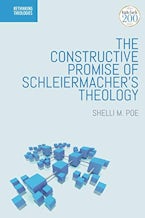- Home
- Perspectives in Continental Philosophy
- religion
- philosophy
- literary criticism
- A Theology of Failure

A Theology of Failure
Žižek against Christian Innocence
By: Marika Rose
Series: Perspectives in Continental Philosophy
240 Pages
- Paperback
- ISBN: 9780823284061
- Published By: Fordham University Press
- Published: May 2019
$35.00
“Theology has failed” (1). This is the starting point for Marika Rose’s A Theology of Failure: Žižek against Christian Innocence. As the title suggests, Rose’s aim is not to provide one more restorationist fantasy but to call out how theologians fall into them. That is, every new theological current seeking a way out of the various impasses of modern theology assume that there is a normative, standard, pristine Christianity. Perhaps it is in the past, perhaps it is in the future, but all assume it implicitly. By drawing on the conversation between continental philosophy and the apophatic tradition, Rose proposes a materialist approach to Christian theology that takes for granted that the church is always impure, always failing, and that the two should not be equated. Rose hopes to “help theology fail better” (13).
Rose highlights the appropriation of Pseudo-Dionysius the Areopagite by various postmodern thinkers, especially Jacques Derrida. After explicating four main loci of Pseudo-Dionysius’s thought—freedom, materiality, hierarchy, and universalism—Rose shows how these themes reappear in postmodernist discourse and how its theological heirs have (mis)handled the tensions therein. Pseudo-Dionysius was innovative in their fusion of Christian and neo-Platonic thought. Their success, and the reason for their appropriation by continental philosophy, lie in the interweaving of language, being, God, and the economy that binds them. Yet Pseudo-Dionysius’s generative thought also brings certain tensions between the four named loci.
It is due to insufficient attention to these loci that Rose traces the theological imperialism inherent in radical orthodoxy and deconstructionist theology. While responding to Derrida in disparate ways, both movements suffer from an inability to acknowledge or affirm the differences and violent complexities at work in modernity. Thus, neither are able to offer a real alternative to the status quo.
To do just this, Rose turns to the materialist ontology of Slavoj Žižek. Žižek’s ontology synthesizes Jacques Lacan and G. W. F. Hegel to construct a metaphysics of incompleteness. Reality is continually incomplete. Language and being—physical reality—are mutually constituting; being makes language possible, and language makes being comprehensible. But their mutual constitution also prevents completion; language can never fully grasp being, and being can never be grasped apart from language. The significance of this incompleteness is the possibility of revisioning Pseudo-Dionysius’s economy around drive rather than desire. Whereas desire aims to obtain its object, drive obtains satisfaction from the repeated failed attempt to obtain.
The main substance of Rose’s constructive argument lies in the last two chapters. The fifth chapter defends the viability of Žižek’s thought by reinterpreting his explication of violence in conjunction with Black, queer, and feminist theologians. By doing so she corrects Eurocentric, racist, or sexist pitfalls that Žižek falls into despite himself. The sixth chapter rereads Pseudo-Dionysius’s discussions of the four kinds of theological discourses through the lens of Žižek’s take on Lacan’s four discourses. These chapters show that Žižek’s materialist ontology can be deployed within a Christian framework in an elucidating manner.
Rose has done a masterful job taking disparate perspectives and bringing them into conversation. Due to both the nature of the project and the presumed hesitancy of readers to buy into a materialist theology, Rose is careful to offer this Žižekian approach as one possible approach. To those familiar with the debates she wades in, and especially those of the deconstructionist crowd, her arguments will be provocative. Rose’s charge of “imperialism with a face” will rile, but her command of the texts of John D. Caputo, Catherine Keller, and Derrida will demand substantial response. To others, the idea of a “theological materialism” (179) will at least become plausible.
Perhaps the one disappointment is that by the end it is still not clear what it might mean for theology to “fail better.” While Rose masterfully tears down the idol of purity, there is still a lingering question of norms. A materialist approach would perhaps respond, “whose norms?” But even within a clearly delimited community, how is one to distinguish between appeals to supposed authority and appeals to purity? The last two chapters show how Žižek’s thought can provide categorizes and formulations for theological reflection, and Rose hints at natural topics to pursue—anti-blackness in modernity, the shape of community, etc. A short attempt at addressing one of these topics through these lenses provided would have gone a long way in clarifying how this approach might proceed.
This book is a valuable contribution to anyone remotely interested in political theology, continental philosophy, or method. The clear, concise, and accessible survey of varied works, movements, and figures, itself makes it worth the read. The arguments in the book will challenge the general reader or seminarian to take seriously the social impact—and potential—of philosophical and theological thought. The expert in the fields of continental philosophy or political theology will find a deft web of theological/philosophical conversation that is sure to stir.
Felix Rivera-Merced is a graduate student at Saint Louis University.
Felix Rivera-MercedDate Of Review:January 24, 2021
Marika Rose is a Lecturer in Phillosophical Theology at the University of Winchester.











